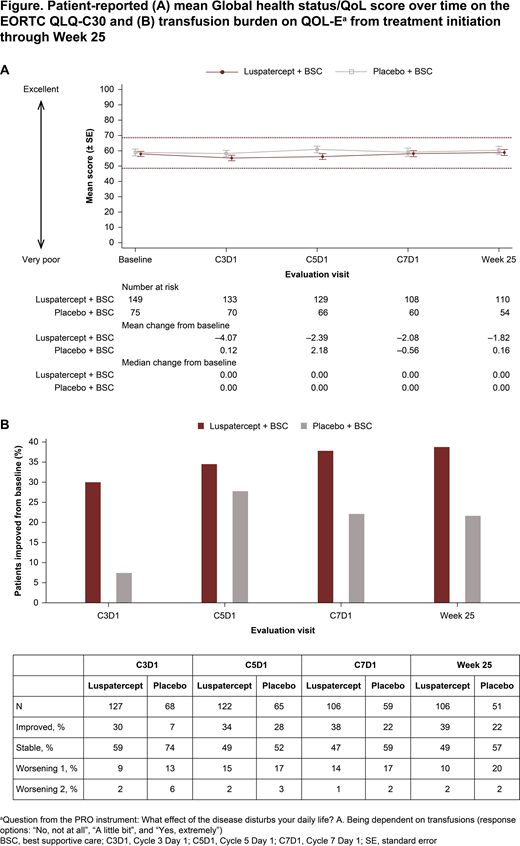Introduction: Patients with myelodysplastic syndromes (MDS) experience severe anemia, which is commonly managed with frequent red blood cell transfusions (RBCT) in patients refractory to erythropoiesis-stimulating agents. At diagnosis, 85% of patients have anemia and 30-50% depend on RBCT. The administration of RBCT itself provides transient relief in anemia-related symptoms. Per protocol, MEDALIST investigators were advised to transfuse for symptoms related to anemia at the investigators' discretion. Hence, cessation or reduction of RBCT may increase anemia-related symptoms and negatively impact health-related quality of life (HRQoL). Luspatercept is a first-in-class erythroid maturation agent providing clinically meaningful reduction in transfusion burden in patients with transfusion-dependent anemia due to Revised International Prognostic Scoring System (IPSS-R)-defined Very low-, Low-, or Intermediate-risk MDS with ring sideroblasts in the phase 3 MEDALIST trial (NCT02631070). However, the impact of luspatercept on patients' HRQoL has not been evaluated. This analysis aimed to evaluate the effect of luspatercept versus placebo on HRQoL of patients treated for MDS from baseline through Week 25 of the MEDALIST study.
Methods: Patients received luspatercept or placebo every 3 weeks for 24 weeks, plus best supportive care (BSC), including tailored amounts of RBCT. Effects of luspatercept versus placebo on HRQoL were evaluated as secondary and exploratory endpoints in the MEDALIST study. In the primary analysis, mean change from baseline to Week 25 (clinical assessment visit) in the European Organisation for Research and Treatment of Cancer's core quality of life questionnaire, version 3.0 (EORTC QLQ-C30) and in the QoL assessment in MDS questionnaire (QOL-E) was determined using mixed-effects repeated measures analysis. Clinically meaningful change within each treatment arm was defined as a ≥ 10-point change in patient-reported outcome (PRO) score from baseline for all EORTC QLQ-C30 domains, and ≥ 0.5 standard deviation of the baseline domain score for all QOL-E domains. Differences between luspatercept and placebo were considered clinically meaningful if the change from baseline between treatment arms exceeded the threshold for a clinically meaningful difference. In an exploratory analysis, patient-reported impact of transfusion dependence and overall side effects on their daily life was estimated using the QOL-E instrument.
Results: A total of 229 patients were randomized; 153 patients to luspatercept and 76 to placebo. The HRQoL-evaluable population, consisting of patients with ≥ 1 post-baseline HRQoL score, was 149 patients in the luspatercept arm and 76 patients in the placebo arm. Questionnaire compliance rates among patients remaining on treatment were similar between luspatercept and placebo treatment groups at Week 25 (EORTC QLQ-C30, 88.2% vs 79.4% and QOL-E, 72.5% vs 69.7%). At baseline, MEDALIST patients had a clinically meaningfully worse HRQoL compared with the general population in 5 of 15 EORTC QLQ-C30 domains: physical functioning, role functioning, social functioning, fatigue, and dyspnea. Through Week 25, there was no clinically meaningful difference in change from baseline between and within the luspatercept and placebo arms across all EORTC QLQ-C30 (Global health status shown in Figure A) and QOL-E domains. A greater proportion of patients in the luspatercept arm relative to placebo reported improvements in daily life from the impact of transfusion burden (Figure B). Relative to baseline, the proportion of patients reporting a lower impact of transfusion dependence on their daily life was 39% versus 22% in luspatercept versus placebo at Week 25; in contrast, the proportion of patients reporting a higher impact of transfusion dependence on their daily life was 12% versus 22% in luspatercept versus placebo. Impact of treatment side effects on patients was comparable between luspatercept and placebo.
Conclusions: Luspatercept with BSC reduced RBCT burden and patient-reported transfusion impact on their daily life, while maintaining other aspects of HRQoL from baseline through Week 25 in the MEDALIST study.
Oliva:Alexion: Consultancy; BMS: Consultancy, Honoraria, Patents & Royalties, Speakers Bureau; Novartis: Consultancy; Amgen: Consultancy; Abbvie: Consultancy; Apellis: Consultancy. Platzbecker:Takeda: Consultancy, Honoraria; Geron: Consultancy, Honoraria; Amgen: Honoraria, Research Funding; BMS: Consultancy, Honoraria; Janssen: Consultancy, Honoraria, Research Funding; Novartis: Consultancy, Honoraria, Research Funding; AbbVie: Consultancy, Honoraria. Garcia-Manero:Bristol-Myers Squibb: Consultancy, Research Funding; AbbVie: Honoraria, Research Funding; Genentech: Consultancy, Membership on an entity's Board of Directors or advisory committees, Research Funding; Helsinn Therapeutics: Consultancy, Honoraria, Research Funding; Onconova: Research Funding; Celgene: Consultancy, Honoraria, Research Funding; Merck: Research Funding; Acceleron Pharmaceuticals: Consultancy, Honoraria; Amphivena Therapeutics: Research Funding; Novartis: Research Funding; Astex Pharmaceuticals: Consultancy, Honoraria, Research Funding; Jazz Pharmaceuticals: Consultancy; H3 Biomedicine: Research Funding. Mufti:BMS, Novartis: Research Funding; Abbvie, Novartis: Consultancy. Santini:Takeda, Pfizer: Membership on an entity's Board of Directors or advisory committees; Janssen: Research Funding; Acceleron, BMS, Menarini, Novartis: Consultancy; BMS, J&J, Novartis: Honoraria. Sekeres:BMS: Consultancy, Membership on an entity's Board of Directors or advisory committees; Takeda/Millenium: Consultancy, Membership on an entity's Board of Directors or advisory committees; Pfizer: Consultancy, Membership on an entity's Board of Directors or advisory committees. Komrokji:BMS: Honoraria, Speakers Bureau; Acceleron: Honoraria; Geron: Honoraria; Agios: Honoraria, Speakers Bureau; AbbVie: Honoraria; JAZZ: Honoraria, Speakers Bureau; Incyte: Honoraria; Novartis: Honoraria. Shetty:BMS: Current Employment, Current equity holder in publicly-traded company. Tang:BMS: Current Employment, Current equity holder in publicly-traded company. Guo:BMS: Consultancy. Zhang:BMS: Current Employment. Ha:Bristol Myers Squibb: Current Employment. Ito:BMS: Current Employment, Current equity holder in publicly-traded company. Lord-Bessen:Bristol Myers Squibb: Current Employment, Current equity holder in publicly-traded company. Backstrom:BMS: Current equity holder in publicly-traded company; Acceleron Pharma: Current Employment, Current equity holder in publicly-traded company. Fenaux:Novartis: Honoraria, Research Funding; Jazz: Honoraria, Research Funding; BMS: Honoraria, Research Funding; Abbvie: Honoraria, Research Funding.
Author notes
Asterisk with author names denotes non-ASH members.


This feature is available to Subscribers Only
Sign In or Create an Account Close Modal